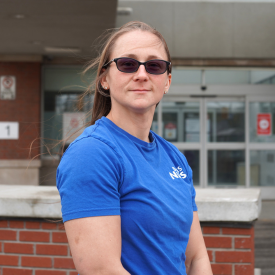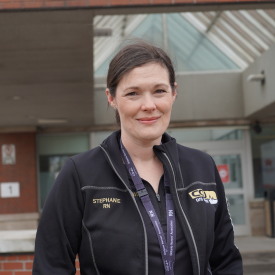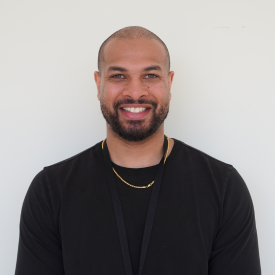Celebrating Nursing Week 2025
Nursing Week Features:
In celebration of Nursing Week 2025, we proudly present another group of exceptional nurses contributing to an excellent patient experience at BCHS. Dive in to gain insights, inspiration, and a deeper understanding of what it truly means to be a nurse.

Amy Farrow, ED Charge Nurse
Can you tell us about your journey in nursing, including the different roles you've held throughout your career and how long you've been in the field?
I have been a registered nurse at BHCS for the past 16 years. I was hired in the Emergency Department right out of school and have worked there ever since.
I am passionate about areas of nursing with high turnover of patients, like the Emergency Department and family birthing. I have been full-time since 2015 and became a full-time Team Lead in the Emergency Department in 2020.
I have worked casually in other Emergency Departments in the surrounding areas of Oxford and Norfolk Counties. I also teach courses like triage to nurses when I am not at the BGH or other ERS.
What is unique about your specialized role that people might not realize or expect?
Working in the ER, you are in a constantly changing environment. No two shifts are alike. The acuity and volume are unpredictable and can change in minutes. You have to be flexible, adaptable and able to handle intense situations calmly as you move from one patient's case to the next.
As a team lead in the emergency department, I am responsible for safely transporting patients from ambulances and the waiting room through the department and supporting and guiding staff. I liken the role of ER team lead to playing the most complex game of Tetris or "Bed Tetris," as I refer to it.
I am also responsible for collaborating with internal teams and external partners like EMS and police. I have worked hard alongside the ED team and the EMS to improve collaboration and significantly reduce our offload delay times to get EMS back in our community instead of sitting for several hours on offload delay in our hallways.
What is your favourite thing about the work that you do as a nurse in this area / What is your “why” for this type of nursing
I like areas of nursing with high patient turnovers; it makes my shift go by fast, and each shift is different from the next. In the Emergency Department, you never know what's coming in next and must work together as a team to solve each patient's problems.
We work well as a team, with everyone coming together to do their part. ESAs, Unit clerks, registration, physio, navigation, physicians, nurses, PAs, specialists, security, EMS, and police are all vital parts of our team.
Without any one of them, we could not succeed. That teamwork keeps most of the staff together in the ER, because despite the chaos, we have each other's backs.
What advice would you give other nurses if they are interested in getting into your area of practice?
You must be flexible, have good time management skills, be willing to work as a team, remain calm, and work well under pressure.

Aleks Ljubinkovic, Director, Quality, Risk and Patient Relations
Can you tell us about your journey in nursing, including the different roles you've held throughout your career and how long you've been in the field?
While I initially aspired to become an Operating Room nurse during nursing school, my path shifted toward critical care early on. After graduating and completing my level 4 consolidation, I was fortunate to start my career in critical care, working in CCU, MSICU, and CVICU for about five years as a Registered Nurse.
I then transitioned into a nurse educator role, where I supported the development of team-based nursing in critical care during the staffing challenges of the COVID-19 pandemic. After nearly two years in that role, I moved into management. Each step and experience has helped shape me into the nurse leader I am today.
What is unique about your specialized role that people might not realize or expect?
As a cardiac intensive care nurse, I earned several advanced certificates. Although I don’t use them in my current role as a Director, I still choose to maintain many and renew my certifications as they keep me mentally engaged and grounded in clinical practice.
Nursing has given me highly transferable skills that continue to shape my leadership. It drives my passion for patient safety and empowers me to advocate for our patients and clinical teams, especially when they’re not present or directly involved in the work I am doing/leading.
What is your favourite thing about the work that you do as a nurse in this area / What is your “why” for this type of nursing
One of the things I enjoy about my current role is how I get to lean on my clinical expertise to make informed decisions, lead improvements, and drive meaningful change. It’s been rewarding to blend my science background with my business knowledge in a seamless and impactful way.
What advice would you give other nurses if they are interested in getting into your area of practice?
Change can definitely be scary, but it’s so important to have the courage to take that leap. When I pursued graduate studies in business, I had many fears especially during the uncertainty of the post-COVID era that I might not return to nursing or healthcare at all. But everything really does happen for a reason, and those experiences helped shape the leader I am today. Please note that it’s never too late to evolve in your professional journey and to grow. Seek out professional mentorship early in your career.

Stephanie Ackland, CCU RN
Can you tell us about your journey in nursing, including the different roles you've held throughout your career and how long you've been in the field?
I started in the Critical Care Unit (CCU) at BCHS in 2007 after having my final placement in my BScN program there, and have been here ever since.
I was in awe of the scope of practice of the RNs here, the difference they made for patients and families, and how integral they were to the function of the healthcare team. I was excited and intimidated to be hired for a position in CCU immediately after leaving school. I am still immensely grateful to the incredible mentors I had to guide me.
I have been part of the Critical Care Response Team (CCRT) since its inception here at BCHS, and am now the site Nurse Lead. It has been very exciting to watch the Team evolve from nurse-led to physician-led, and to be a part of the change process.
I am also a Heart and Stroke Advanced Cardiovascular Life Support Instructor with the BCHS program. I enjoy teaching and interacting with people from all areas of the hospital.
What is unique about your specialized role that people might not realize or expect?
We are always expected to be asking "why" and to be putting the puzzle pieces together. It is about so much more than just the execution of orders and the completion of tasks; it is the expected level of knowledge, skill, and critical thinking that I appreciate so much about the role of the CCU and CCRT RN.
What is your favourite thing about the work that you do as a nurse in this area / What is your “why” for this type of nursing
While I truly love the advanced nursing skills and the role of a highly skilled CCU nurse, the difference that we can make on a human level keeps me in CCU.
We see people at their most vulnerable, and while we have the skill set to manage the critically ill patient, we also can humanize Critical Care medicine, to explain what is happening to the patient and family, and to take the hard edges off what might be their scariest interaction with the healthcare system.
We can do amazing things with modern medicine and help guide people through that process. When those amazing things aren't enough to offer recovery, we can still provide kind, dignified and humane care to the critically ill patient and their loved ones. The care we provide is so multi-faceted - highly technical nursing care, emotional support, education and more.
The human component of the healthcare team, and the relationships you build there, are so rewarding as well. As nurses, we are integral to the healthcare team and interact with many other disciplines. We can build strong, respectful, meaningful relationships there, too. We celebrate each other's successes and support each other when it gets hard.
The COVID years especially highlighted this - while we all joke about trauma bonding, the truth is that none of us would have made it out the other side without the strength of our team.
What advice would you give other nurses if they are interested in getting into your area of practice?
Work to develop a strong foundation in assessment skills, communications skills, and know your normals. There is no way to quickly learn everything you need to know in a CCU. Things are constantly changing, with new skills being added.
Long-standing ones evolving and noticing how the subtle signs of deterioration, then being able to communicate them clearly to the people who need to know (the experienced nursing staff, charge nurses and physicians you work alongside) will be vital, even if you can't put your finger on precisely what is happening.
Never be afraid to say what you don't know, or to ask for help. The best CCU nurses I know always bounce thoughts off others and never stop learning.

Darren Edwards, ICT Application Analyst
Can you tell us about your journey in nursing, including the different roles you've held throughout your career and how long you've been in the field?
I’ve been a nurse for 8 years and have had the incredible opportunity to grow across a variety of clinical areas. I began my career in cardiology at Credit Valley Hospital. I soon embraced the chance to float through Emergency, Nephrology, and Rehab departments. I later worked at Sunnybrook Health Sciences Centre in Cystoscopy and the Endoscopy Recovery Room.
Most of my nursing experience has been in Hemodialysis at Humber River Health, where I provided care across various settings, including Transition Care, Home Dialysis, and Long-Term Care Home Dialysis. I also served as the Clinical Lead for the Hemodialysis Meditech Expanse Project during that time.
Today, I’m proud to continue supporting patient care differently through my role at BCHS as an ICT Application Analyst.
What is unique about your specialized role that people might not realize or expect?
Many of my nursing skills have naturally carried over into my new role as an ICT Application Analyst. Understanding clinical communication, documentation practices, and frontline workflows is key to patient care.
My clinical background helps bridge the gap between technology and frontline staff, ensuring that changes are practical and aligned with nursing needs.
What is your favourite thing about the work that you do as a nurse in this area / What is your “why” for this type of nursing
My “why” has remained consistent throughout my career, no matter what area I’ve worked in: to provide the best possible care for patients. While my role has shifted away from direct bedside care, I’m still deeply committed to positively impacting patient outcomes.
By understanding workflows and collaborating with nurses, physicians, and allied health, we can explore ways to make charting more efficient and intuitive, ultimately enhancing safety for both staff and patients. As a result, when nurses feel confident and supported by the tools they use, they can spend more time focused on what matters most: delivering excellent patient care.
What advice would you give other nurses if they are interested in getting into your area of practice?
Many nurses may not realize that there are multiple pathways into Healthcare Informatics and other non-clinical roles, many of which begin within your everyday practice. Nurses are constantly critically thinking, and our deep understanding of workflows and patient care is incredibly valuable for system changes and practice improvement.
My advice? Look for opportunities to suggest improvements, collaborate with your educators and managers, and actively participate in any project, big or small. Even small changes can make a significant impact.
We extend our heartfelt gratitude to all nurses for their unwavering commitment to patient care and their invaluable contributions to BCHS and the wider community.




